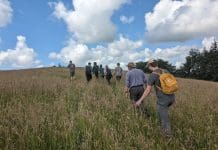Bristol City Council has today (1 July) launched its first Traffic Clean Air Zone consultation on two options to lower pollution in the shortest possible time
The council also to minimise any impact for people on lower incomes. The consultation runs for six weeks with the deadline for responses on Monday 12 August 2019.
The proposed options are one element of the wider environmental and clean air plans for Bristol, announced by the mayor of Bristol on Clean Air Day, which is designed to protect everyone from toxic fumes and ensure the city is playing its part in tackling global climate change.
Marvin Rees, mayor of Bristol, said: “Air pollution affects everyone in Bristol. Whether you drive a car, cycle or walk, you are exposed to high levels of pollution which can cause breathing problems like asthma, plus other lung and heart problems, ultimately shortening lives. Nitrogen dioxide (NO2) is one of the most harmful pollutants and is currently at illegal levels in cities across the UK, including Bristol.
“Protecting the most vulnerable from pollution is central to our plans and we have developed the two options which we think strike the right balance, reducing toxic fumes in the shortest possible time but in a way that does not adversely affect the people with lowest incomes or widen the inequality divide in the city.
“We cannot do this alone as individuals. We must come together to take action. The next step involves giving your feedback on the options we have developed. Please tell us how you think it will affect you and what we need to consider.”
The two options are:
Option 1: Clean Air Zone (private cars not charged)
- A zone where more polluting buses, coaches, taxis, heavy (HGVs) and light goods vehicles (LGVs) would be charged for each day they are driven in the zone. Taxis and LGVs would be charged £9 per day. HGVs, coaches and buses £100.
Option 1 would also include:
- A 24-hour a day, seven day a week HGV weight restriction on the worst polluted routes;
- A diesel car ban on Upper Maudlin Street and Park Row running from St James Barton roundabout to Park Street between 7am and 3pm, seven days a week (this would not apply to taxis/private hire or emergency services);
- Bus and local traffic changes in the most polluting areas including an inbound bus lane on the M32, an inbound bus lane on Cumberland Road and using existing traffic signals to control the amount of traffic entering congested areas with poor air quality;
- A scrappage scheme (up to £2,000) for diesel cars. This would provide a grant towards a newer cleaner vehicle or an alternative mode of transport (e.g. bus travel or purchasing a bike).
Option 2: Diesel car ban
- Banning all diesel cars from driving in a specific central area (small zone) from 7am to 3pm, seven days a week (this would not apply to taxis/private hire or emergency services). Other measures, including a scrappage scheme, could also be included.
- The council is holding a number of drop-in sessions to give the public the opportunity to discuss the options in more detail.
Drop-in sessions
Barton Hill Settlement
43 Ducie Road, Barton Hill, BS5 0AX
Thursday 11 July, 2.30pm-7.30pm
Easton Leisure Centre
Thrissell St, Easton, BS5 0SW
Monday 15 July, 3.30pm-7.30pm
Hope Chapel
Hope Chapel Hill, Hotwells, BS8 4ND
Monday 22 July, 2.30pm-7.30pm
Marksbury Road Library
Marksbury Road, Bedminster, BS3 5LG
Wednesday 24 July, 2.30pm-7.30pm
Malcolm X Community Centre
141 City Road, St Pauls, BS2 8YH
Tuesday 30 July, 2.30pm-7.30pm
City Hall (Vestibule)
Just off Park Street towards main entrance
Tuesday 6 August, 2.30pm-6.30pm

















